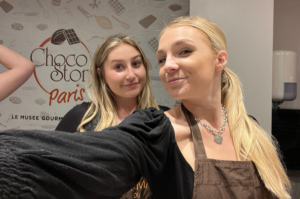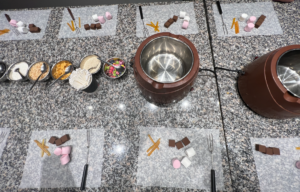Ever since I was a little girl, I’ve loved chocolate. The evidence of this is immortalized in my house’s hallways where there is more than one framed photo of me with chocolate frosting or ice-cream smeared all over my face. So, when I heard that one of our excursions on this program was a chocolate-making workshop, I knew that it was my time to shine.
On our trip to the chocolate museum, we had the opportunity to create and decorate multiple kinds of candies and chocolate bars to get a hands-on experience before exploring the museum full of chocolate facts. Though my work might not have been the prettiest in the room, I had fun exploring and trying new techniques in the process. In fact, I felt like six-year-old me all over again by the end of the workshop, with melted chocolate on my hands, face, and all over my apron.

Later in the museum, though, my friends and I found an interactive exhibit that explained chocolate’s effects on the body. The information detailed the effects of chocolate on the skin, bones, digestive system, mood, and multiple other bodily systems. Naturally, as a product of the fact that I’ve been thinking a lot about neuroscience lately, this made me wonder about the effects of chocolate on the brain. I had read literature regarding chocolate’s effect on mood and cognition but was curious as to whether or not it could have a more direct physical effect on brain structure and function.
One paper I found explored the relationship between methylxanthines found specifically in chocolate, such as caffeine and theobromines, on neuronal plasticity. This study did acknowledge that in research, animal models exposed to higher levels of methylxanthines

can protect neurons from dysfunction and even death in the case of a stroke. This work eventually could potentially be translated to neurodegenerative disease, which is a fascinating real-world implication. This effect can also be translated to other methylxanthine-rich foods and beverages, such as tea and coffee. As someone who is an avid coffee and chocolate fan, I can’t complain about the findings of this paper.
While we’re on the topics of chocolate, Paris, and chocolate in Paris, I figured I would leave you with an insider tip: the best hot cocoa in Paris is undoubtedly at Cafe De Flor. So, if you want to protect your neurons while also having a delicious drink break, head over to the 6th arrondissement and pick up a cup.
References:
Camandola, S., Plick, N., & Mattson, M. P. (2019). Impact of Coffee and Cacao Purine Metabolites on Neuroplasticity and Neurodegenerative Disease. Neurochemical research, 44(1), 214–227. https://doi.org/10.1007/s11064-018-2492-0
